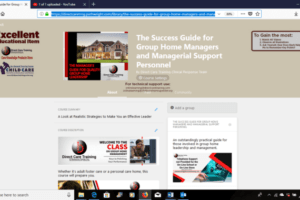
Most professionals have spoken with someone who complains about not being able to find refinement courses with a specific focus on them and their work. They also want an online course that allows them to learn and grow while juggling the many balls most of our work routines involve.
For those who manage group homes, a form of assisted living, often for specialized populations, there is a course now available that speaks to every possible situation that could impact the group home manager’s performance. This Blog speaks to two, (2) of the main sections which are:
- Managing Attendance and
- Managing Personal Insecurity
Shall we cover a few highlights? Let’s Start with Managing Attendance with a focus on:
- Why Good Attendance Matters
- How to Promote Good Attendance
Good attendance matters for a variety of reasons. For one, it demonstrates respect for fellow team members. By the way, we recommend you use the designation, “Team Member” and not employee, staffer, direct care worker, etc. It’s good to promote a sense of working together – which is why a manager who refuses to delegate or is riddled with insecurity will not be effective long-term unless they get this under control. (More on that later)

You Set The Culture..
In both the interview and the New Employee orientation, thoroughly review your attendance policy with everyone. For example, if a person is tardy or absent in a 90-day period and these are unexcused, is their employment in jeopardy? If so, make this clear. Then when two, (2) such occurrences happen, alert them to where this is headed.
If you use a scheduling app which we highly recommend, it can be programmed to give them this private warning. Of course, this will be coupled with an Employee Infraction Form.

We Create a Culture Based Upon What We Indicate We Expect…You Cannot Enforce What is Not Published.
Some group home managers use other innovative ways to promote responsible attendance. These include:
- Rotating weekends so no one works every weekend
- Having a designated staff member on call during a given week and rotating it. So, for this week Shawn is on call to come in when there is a call-off, next week its Lisa, next week its Martha, etc. In this way, one designated person can plan their outside life around the weeks they are on call, which should be published well in advance.
- Some use a wake-up and/or reminder service to remind Team Members of the next shift wherein they are due for work. This can occur the day or evening before, morning before or morning of a shift.
Let’s Now Bridge to the Issue of Personal Insecurity…
- What Insecurity Is
- How to Manage it in the Workplace
Anyone can suffer from personal or emotional insecurity. What exactly is it? Here is the common definition:
“Emotional insecurity or simply insecurity is a feeling of general unease or nervousness that may be triggered by perceiving of oneself to be vulnerable or inferior in some way, or a sense of vulnerability or instability which threatens one’s self-image or ego. “
This is a large concern for a manager and the one who employs you. Why? Because an insecure person may have difficulty:
- Counseling others, even after serious offenses (If we are not secure with ourselves, it can be tough to point out work-related shortcomings of others).
- Accepting the need for change, especially if new processes force new learning
- Accepting the involvement of additional personnel in the workplace with a higher skill level. Some insecure managers may prefer those who are inferior instead of superior talents because they fear someone might outshine them in some way.
Behavioral Examples of the Insecure:
- They may brag about knowledge or experience that does not exist or that exists differently than stated.
- They may profess a credential that does not exist.
- They may verbally brag about a commitment to solve a particular issue only when it is brought up by others to appear focused differently than they are, when the matter has been ignored for some time.
How can we overcome this?
In ourselves:
- Tell the Truth
- Do Your Work as Committed
- Be committed to learning and growing. This is the age of technology. Can your boss rely upon you to develop an Excel Spreadsheet and use it for budgeting, supply inventory or scheduling? Knowing the level of efficiency that technology can add to your value and considering how many love and embrace technology, is this not a worthy aspiration for you, regardless of age to increase your value?
The more we invest in self and the more honest we are, the bigger dent we put in feelings of insecurity.

Remember, a proactive manager is always looking for ways to keep the operation efficient. There should not be significant stress associated with preparing for a licensing survey, etc. Daily and weekly processes should have us always ready.

Managing Insecurity In Team Members: Dignify them! Perhaps someone has the role of a Direct Care Worker. Can they also be used to grocery shop, look for specific coupons to reduce the grocery bill of the home, etc? How about write and/or prepare a menu, cleaning/sanitation schedule, etc?
In this online course there is a Sample Sanitation Routine. Perhaps you can customize it to make the home you manage an even brighter example of cleanliness.
_________________________________________________________________________
When we allow people to step out of their norms, we foster their growth and dignify them as a person.

Find this course, with a special Human Resources section for use by those who manage smaller and medium sized assisted living programs, often referred to as group homes in the virtual school at www.directcaretraining.com or by Clicking Here.
For today, thanks for playing along.
_______________________________________________________
A Blog Post from Direct Care Training & Resource Center. Follow Us in the Social Stratosphere….






